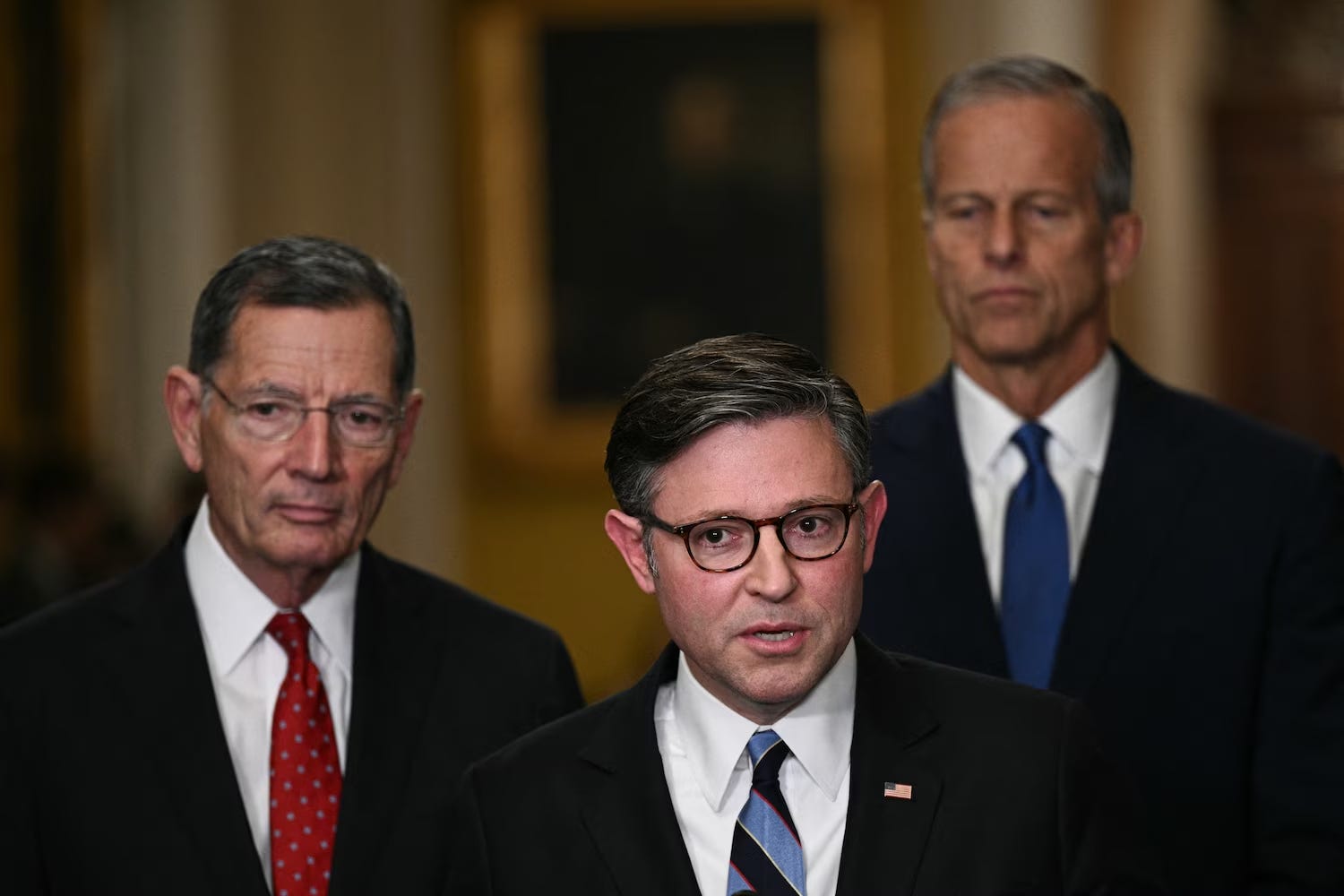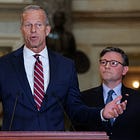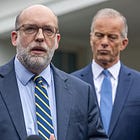How Speaker Johnson’s political missteps worsened the shutdown standoff
Democrats see a GOP leader struggling to contain a funding lapse of his own making as insiders quietly acknowledge that Trump controls how and when it ends.

MORE THAN TWO WEEKS AFTER Adelita Grijalva won a special election to succeed her late father by nearly 40 points, the Arizona Democrat is still waiting to be sworn in. Speaker Mike Johnson (R-La.) has yet to schedule her oath of office, even as he swore in three other special-election winners—two Republicans and a Democrat—within 24 hours of their victories earlier this year.
The delay has become more than a procedural nuisance for Democrats. It captures what they see as Johnson’s muddled leadership amid a government shutdown now stretching into its second week—and to some, a convenient stalling tactic as he fends off suspicion about a bipartisan push by members to force a vote on releasing the full Epstein files, which Grijalva’s addition would allow.
Johnson has consistently swatted away claims that the files are a variable in his decision to dillydally on Grijalva’s swearing in, instead pointing to the reality that the House is in recess after he canceled votes for the second consecutive week. But on Tuesday afternoon, a breakthrough seemed at hand as Johnson told reporters that he would schedule the ceremony as soon as Grijalva wants—never mind that she’s been in town since her election demanding it. Hours later, a senior GOP leadership aide suggested otherwise, blaming Senate Democrats for keeping the House out of session and delaying Grijalva’s swearing-in.
The episode captures the essence of Johnson’s speakership at this stage of the shutdown: a leader increasingly cornered by the politics of his own making, according to conversations with a half dozen Democratic members, aides and operatives who were granted anonymity to provide their candid assessments of the current state of play. They argue that Johnson’s decisions—from advising President Donald Trump not to meet with Democratic leaders before the shutdown to canceling House votes to struggling to keep his members on message over healthcare—reflect a speakership losing both coherence and control.
“Mike Johnson’s been able to mask over his deficient leadership with a few back-pats from Donald Trump. Now the cracks are showing because he’s got to ask his members to defend insurance premiums doubling,” a Democratic strategist said. “We don’t need a history book to know what happens when there is a vacuum of leadership in their conference.”
PARTY UNITY IS A VITAL component to political success in shutdown fights. Johnson and Senate Majority Leader John Thune (R-S.D.) have projected a singular message since the federal government’s lights went out last week: The first order of legislative business is to send a short-term measure to fund federal agencies and departments through mid-December to President Trump’s desk and then we can discuss a path forward on addressing the health care policy priorities that are central to Democrats’ demands to end the shutdown.
But cracks in this strategy have emerged this week. On Tuesday, standing side by side at the Senate Republicans’ weekly leadership press conference, Thune contradicted Johnson’s suggestion that the House might reconvene to pass a standalone bill paying U.S. troops and air traffic controllers during the shutdown. Moments earlier, Johnson expressed openness to the idea, emphasizing that it wasn’t without precedent in previous shutdowns to ensure paychecks wouldn’t lapse.
Thune quickly cut in. “Honestly, you don’t need that,” he said flatly, arguing that the simplest way to end the impasse was to reopen the government. The striking moment was a rare instance of the top Republican in each chamber parting in public over substance and strategy.
Of course, the scene spoke volumes for Democrats.
There Johnson was seemingly improvising under pressure, while Thune wanted no part of it, and both undercutting their own argument that Republicans were unified in pursuit of a responsible resolution. Even some GOP aides privately admitted the optics were rough, not least because troop pay is among the few shutdown flashpoints that reliably unite voters across party lines.
IF THE GOP PRESS-CONFERENCE MOMENT exposed cracks in strategy, Rep. Marjorie Taylor Greene’s comments blew a hole in message discipline after the Georgia Republican publicly rebuked her party’s leadership for ignoring the cost of health care as the core issue driving voter frustration.
Greene accused GOP leaders of having “no plan” to address the affordability crisis, saying they’d spent more time arguing over process than helping families struggling to pay premiums. She warned her party has “to get real and actually come up with a solution,” adding that her own adult children’s insurance costs were set to double. She described hearing the same story from constituents back home.
While reaffirming her long-standing opposition to the Affordable Care Act, which she called a “scam” that raised prices for her family when it passed, Greene nonetheless endorsed Democrats’ demand to extend the ACA’s enhanced premium tax credits through the end of the year. She framed the stance as part of an “America-only” approach. She said she was willing to work with anyone “who’s serious about lowering costs,” even if it meant defying her party during the shutdown debate.
Democrats seized on Greene’s position. Jeffries was flanked by a chart of MTG’s tweet at his daily shutdown press conference, while Schumer mentioned her comments in a Senate floor speech. House Democrats’ campaign arm even got in on the action.
But Johnson brushed off the criticism, noting that Greene holds no seat on the committees of jurisdiction over health care policy and suggesting she was ill-informed of the issues. Her comments ricocheted through the Hill nonetheless, giving Democrats unexpected validation for their core argument that Republicans had ceded the political high ground on health care and reinforcing their case that the GOP’s shutdown strategy is backfiring on multiple fronts.
ACCORDING TO SOURCES in both parties, Johnson’s missteps began well before the government shutdown. For example, Johnson privately advised President Trump to cancel a White House meeting with Democratic leaders that had already been agreed upon due to fears that Trump might strike a health care deal with Senate Majority Leader Chuck Schumer (D-N.Y.) and House Minority Leader Hakeem Jeffries (D-N.Y.) that GOP leadership couldn’t control. Days later, Trump’s team quietly rescheduled the meeting, only for Democrats to emerge calling Johnson an impediment to compromise. Since then, he has refused to meet directly with Democratic leaders to negotiate a path forward, even as the House-passed stopgap bill and Democrats’ counterproposal are on track to fail in the Senate this morning for the sixth time in 19 days.
Johnson’s decision to cancel votes again this week has only deepened those concerns. Democrats have seized on his absences—and the empty chamber—to argue that Republicans are responsible for prolonging the shutdown since the party controls the federal government. Whatever legitimate critiques exist of the enhanced ACA tax credits have been drowned out by the optics of a silent majority: House Republicans back home on their own and instructed to claim Democrats want to fund health care for undocumented immigrants, while Democrats fill the vacuum in Washington with programming on the calamitous impact the expired credits would have on everyday Americans.
“He’s losing his conference,” a House Democrat said.
A senior Democratic aide was equally frank: “He’s been outflanked, outstretched and outperformed.”
Even Johnson’s messaging has shifted uncomfortably. After weeks of insisting the conversation around the ACA subsidies would happen at the end of the year, he claimed on Tuesday that Republicans always intended to discuss them this month— a reversal that drew an incredulous grin from Jeffries when I asked him about it later that morning.
“Really, this is what we’re doing right now? This is an acknowledgement that the Democratic position is the American position, which is that this healthcare crisis has to be addressed right now,” the top House Democrat told me. “But they still have to actually sit down at the negotiating table so we can resolve the issue consistent with what Marjorie Taylor Greene has said needs to be done: Address the cost-of-living crisis that Republicans have made worse in the United States of America.”
Then there’s his subsequent decision to endorse an Office of Management and Budget memo interpreting a 2019 law guaranteeing back pay for furloughed workers as subject to presidential discretion only reinforced Democrats’ broader argument that Trump is using the shutdown to inflict political pain, with congressional Republicans providing cover.
Spokespeople for Johnson and Thune did not respond to a request for comment, but Johnson did receive a vote of confidence from the White House.
“President Trump, Speaker Johnson, Leader Thune and congressional Republicans are in complete lockstep and have been consistent: We are happy to have a policy conversation once the government is reopened,” White House spokesperson Abigail Jackson said in a statement. “Democrats have chosen to shut down the government because they want to give free health care to illegal aliens. The administration will not negotiate while the American people are being held hostage by Democrats.”
STILL, IT REMAINS to be seen if Johnson’s stumbles amount to a personal political crisis. Several sources across both parties and chambers acknowledged that the speaker’s political survival—and the ultimate resolution to the shutdown—have always rested in President Trump’s hands. From that perspective, Johnson’s role isn’t to broker a compromise so much as to execute one once Trump decides the politics favor it.
“Johnson isn’t in control. Neither is Thune. They both report to Donald Trump and that’s why there’s no end in sight for this shutdown,” a second Democratic strategist told me. “Johnson is a failed leader, there’s no question about that. His party controls the House, Senate and White House, and he still can’t deliver a budget. But we’d be deluding ourselves if we think Johnson is in control here.”
But after months of relegation to the political wilderness following the 2024 election and the turmoil of the first nine months of Trump 2.0, most sources told me it would be foolish to allow Johnson’s perceived blunders to distract them from what they believe to be a winning message on health care.
“They should double down on their current strategy,” the second Democratic strategist said of their party’s congressional leadership. “Keep their foot on their necks—daily press conferences, interviewing on every channel, all over social. They have to win the narrative. They win the narrative, they win the war. They can’t allow public sentiment to switch now.”




